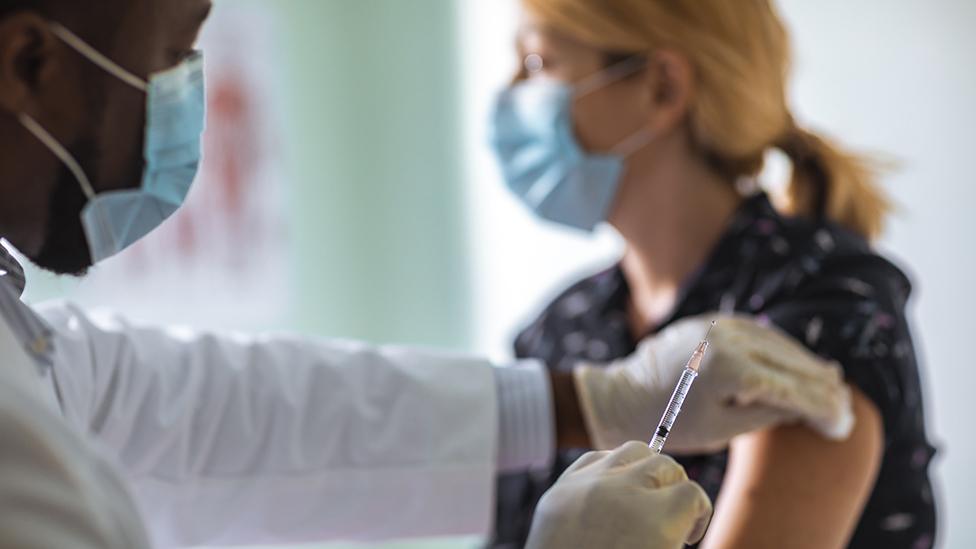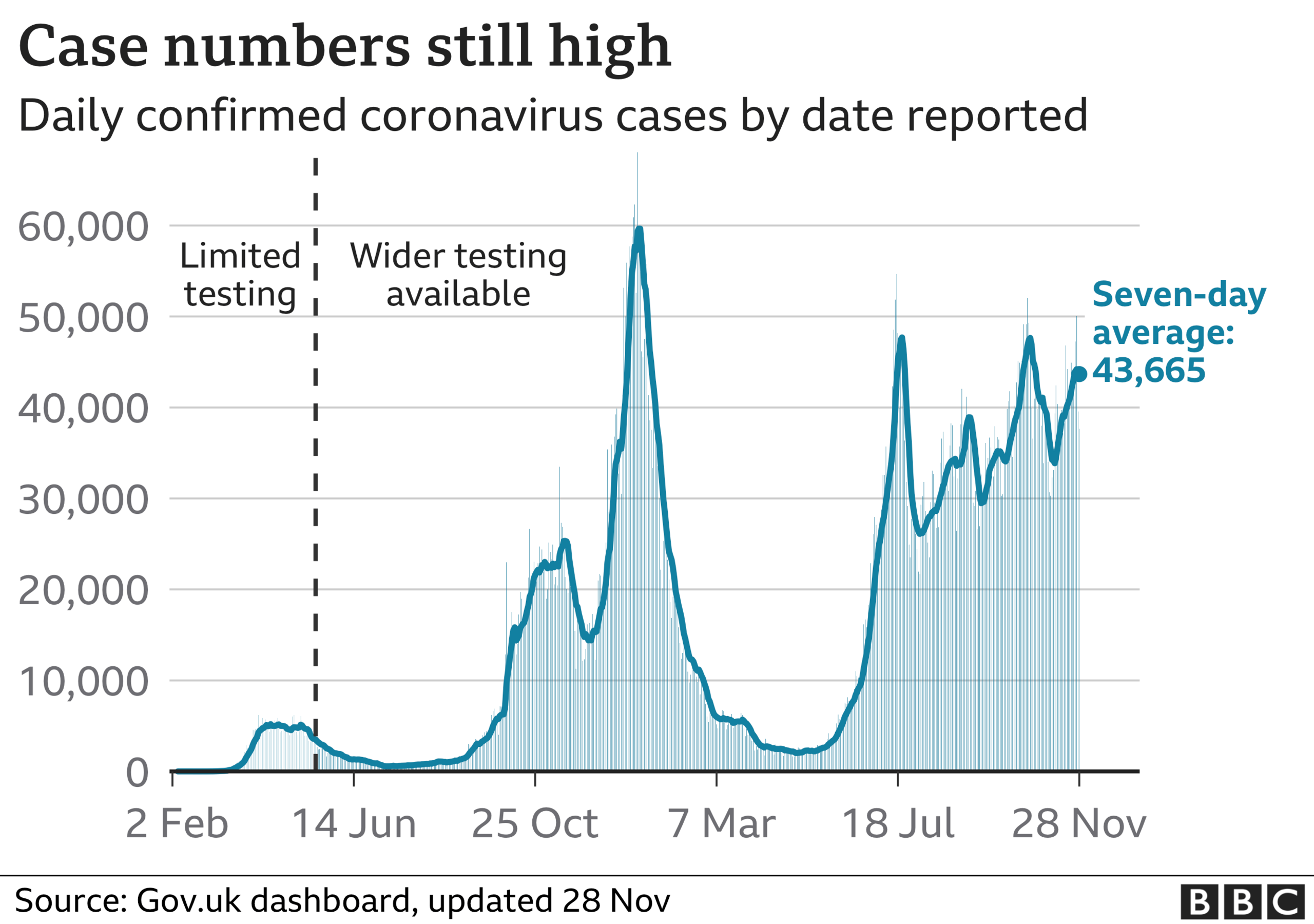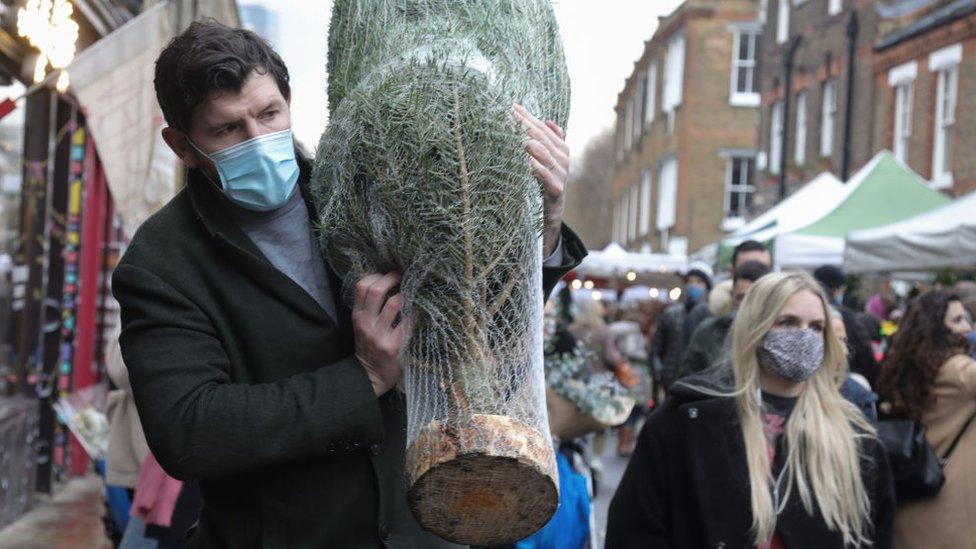Covid: JCVI scientists to announce decision on booster rollout
- Published

The UK's vaccine advisory body is set to announce later if it will back an expansion of the Covid booster scheme.
Nine cases of the Omicron variant have been found in the UK so far and Number 10 has set out measures to contain it.
Prof Anthony Harnden, deputy chairman of the Joint Committee on Vaccination and Immunisation (JCVI), said it would be "sensible" to cut time between doses and extend boosters to the under-40s.
Regulations on face masks and isolation rules are due before Parliament later.
The JCVI only advises the government and the final decision on measures to combat Covid always lies with the politicians - but Prime Minister Boris Johnson has said he intends to wait for the recommendations from the scientific experts who make up the committee.
Its recommendation will be announced at a Downing Street coronavirus briefing at 15:00 GMT.
Speaking at the briefing will be England's deputy chief medical officer, Prof Jonathan Van-Tam, Prof Wei Shen Lim, chair of the JCVI and Dr June Raine, chief executive of the Medicines and Healthcare Products Regulatory Agency (MHRA).
Meanwhile, an urgent meeting of health ministers from the G7 group of nations is taking place "to discuss the developments on Omicron", the Department for Health said.
Early evidence suggests the new Omicron variant - initially reported to the World Health Organization from South Africa on Wednesday - has a higher reinfection risk.
The Scottish government announced on Monday morning that six cases of the variant had been identified in Scotland, with four in Lanarkshire and two in the Greater Glasgow and Clyde area.
Some of the cases identified in Scotland have had no travel history and caught the virus variant in the community, Deputy First Minister John Swinney told BBC's Good Morning Scotland.
The first UK cases - picked up from analysis of recent positive Covid tests from all around the country - were confirmed on Saturday in Essex and Nottingham.
The third case identified on Sunday came from a visitor who spent time in the Westminster area of London, although the person is no longer in the UK, the Health Security Agency said.
The agency said it was "very likely" more cases would be found in the coming days.


You might be wondering what's the point of a booster if the current vaccines turn out to be less effective against Omicron?
We don't know if that will be the case, but mutations in Omicron mean the jabs may not perform as well.
The vaccines will have taught your body to spot the original coronavirus that emerged in Wuhan in China.
The mutations on Omicron are like it putting on a disguise to slip past your body's guard.
But boosting is the equivalent of hiring more guards to compensate.
You'll have more crucial components of the immune system such as antibodies and T cells circulating in the body to increase the chances of seeing through the virus's disguise.
If Omicron does prove to be a problem then boosting is the quickest way of enhancing people's protection as it will take about 100 days to update the vaccines if (and it is a major if) that turns out to be necessary.

Because there are also high levels of cases of the dominant Delta variant, Health Secretary Sajid Javid said at the weekend he would be asking the JCVI to consider backing the rollout of booster jabs to a wider population than at present.
Prof Harnden, from the JCVI, told BBC Radio 4's Broadcasting House programme on Sunday there was a "strong argument" for extending boosters to all adults.
"Accelerating the booster programme both by extending the age range and by reducing the interval between the second dose and the booster dose would be a sensible strategy," he said.
Currently, booster jabs have been restricted to those aged 40 and over, front-line health or social workers, and those with health issues.
Asked in the Radio 4 interview whether everyone over 18 should expect an invitation to get a booster jab, Prof Harnden responded that the offer would come "earlier than we have previously envisaged".
At the moment, people aged 16 and 17 can book a second dose of the Pfizer jab - to be administered at least 12 weeks after their first. All 12 to 15-year-olds are currently being offered a single Pfizer dose.
Prof Harnden told BBC Breakfast on Monday there was "an argument" for reducing the interval between doses for 16 and 17 -year olds and to look at whether 12 to 15-year-olds should get a second jab.
The government announced at the weekend that face coverings will become compulsory in shops and on public transport in England, and pupils in Year 7 and above, plus school staff and visitors, are being advised to wear face coverings in communal areas.
It placed 10 countries - South Africa, Namibia, Zimbabwe, Botswana, Lesotho, Eswatini, Angola, Mozambique, Malawi and Zambia - on the UK red list, external, so only British or Irish nationals or those with UK residence rights will be permitted entry if travelling to the UK from those nations.
They also must quarantine in a government-approved hotel for 10 days at their own expense.
Some travellers trying to return to the UK from South Africa have complained on social media they have been struggling to book quarantine hotels on the dates they need.
A spokesperson for the Department of Health and Social Care said it was "rapidly expanding capacity" following the red list additions, and that it expected to have more rooms available to book this week.
And from 04:00 GMT on Tuesday, everyone entering the UK will have to take a PCR test and self-isolate until they receive a negative result.
The PM announced the "temporary and precautionary" measures at a Downing Street news conference on Saturday, adding they would be reviewed in three weeks.

Under the rules due to come in on Tuesday:
Everyone entering the UK (other than those coming from the Common Travel Area that covers the Channel Islands and Ireland) will have to take a PCR test by the end of the second full day after their arrival and self-isolate until they receive a negative result
All contacts of suspected Omicron cases must self-isolate for 10 days, regardless of whether or not they are fully vaccinated
Face coverings will be made compulsory on public transport (bringing England into line with the other UK nations) and in shops - but pubs and restaurants will remain exempt.

The government agreed last year to give MPs a vote before introducing new pandemic measures.
This means the latest measures, due to be laid before Parliament later on Monday, need a majority in the Commons before they will go ahead.
Historically the PM has faced opposition to coronavirus restrictions from among his own backbenchers.
Conservative MP Steve Baker, deputy chairman of the Covid Recovery Group, told the Daily Telegraph, external the measures "will cause chaos" in schools as, under the rules, children will be expected to isolate after coming into contact with the Omicron variant.
"The government needs to explain when all of this will be brought to an end," Mr Baker said.

Scotland's First Minister Nicola Sturgeon has urged the prime minister to take a tougher approach to travel restrictions.
In a joint letter with the Welsh First Minister Mark Drakeford to Mr Johnson, she has requested increased measures that would see UK arrivals isolate for eight days - with PCR tests on day two and day eight.
Speaking during Monday's Scottish government's coronavirus briefing, she said the measure would be more effective at identifying cases of the Omicron variant and help prevent further community transmission.
However, the prime minister's spokesman said there were no plans to introduce tougher isolation and testing requirements as they would have a "detrimental effect" on the travel sector and people wishing to travel abroad.
In a virtual address to the SNP conference, the first minister urged people to "pull together" over the winter months to stop spread of the Omicron variant and have a greater chance of a more normal Christmas.

Have you had a Covid vaccine booster? Will you be having one? Please get in touch by emailing haveyoursay@bbc.co.uk, external.
Please include a contact number if you are willing to speak to a BBC journalist. You can also get in touch in the following ways:
WhatsApp: +44 7756 165803
Tweet: @BBC_HaveYourSay, external
Please read our terms & conditions and privacy policy
If you are reading this page and can't see the form you will need to visit the mobile version of the BBC website to submit your question or comment or you can email us at HaveYourSay@bbc.co.uk, external. Please include your name, age and location with any submission.

THE SLEEPING FORECAST: Get cosy with our winter playlist
WHAT IS RACHEL RILEY'S EMBARRASSING HABIT?: Joe Lycett finds out in 'It's Not What You Know'

- Published11 February 2022

- Published28 November 2021
